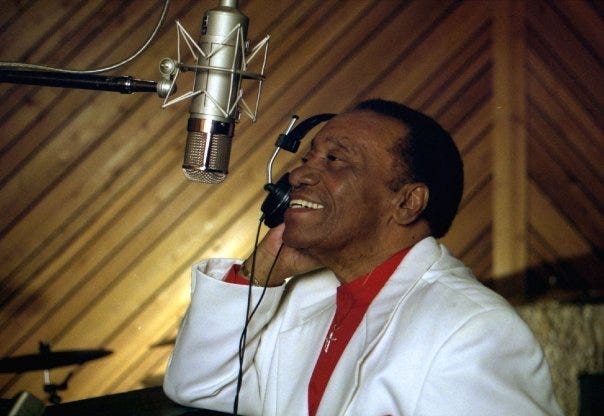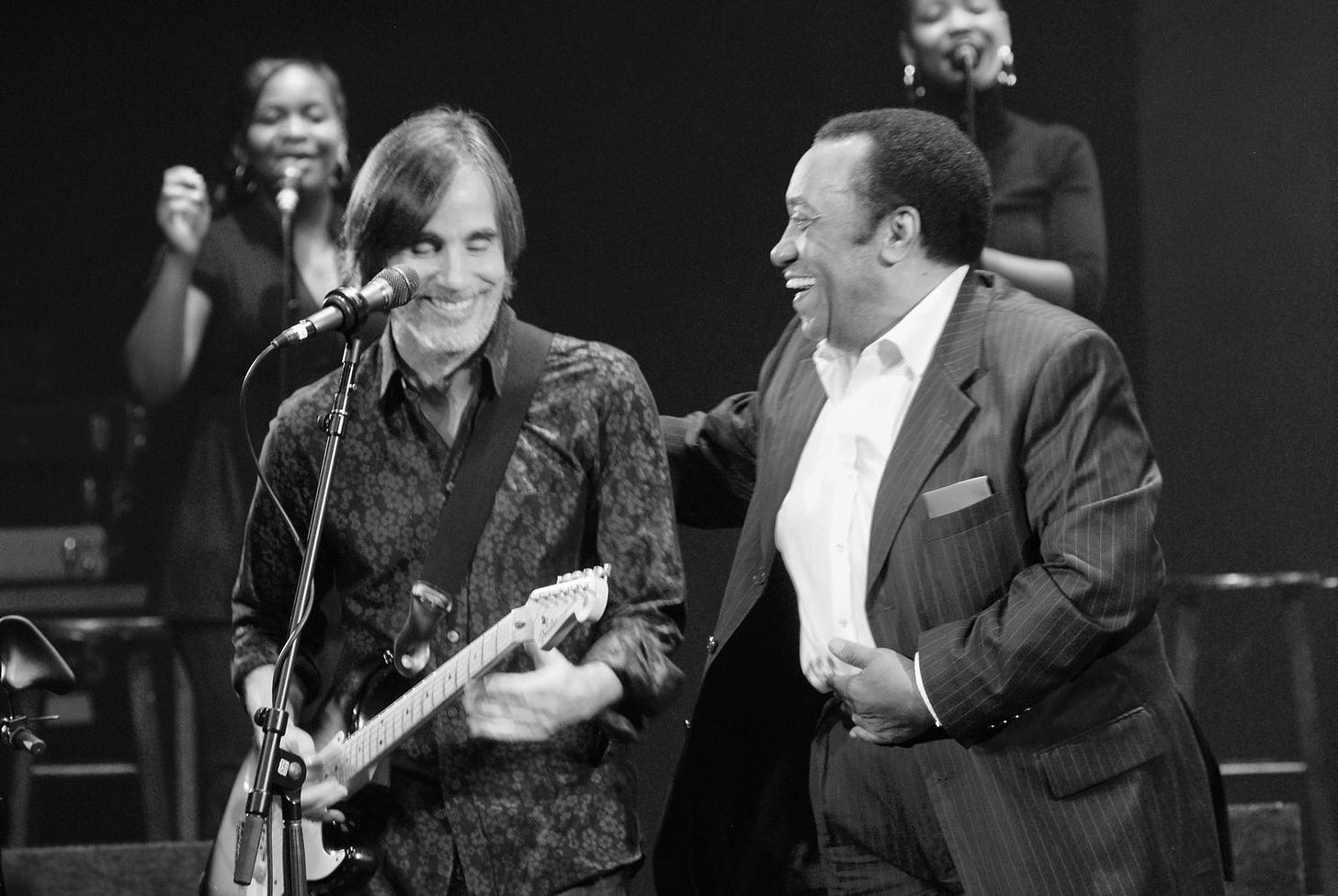Ways of Life: A legacy with staying power
He wrote a classic No. 1 tune inspired by young love
You’re reading Ways of Life, a weekly obituaries newsletter from The Charlotte Ledger honoring our friends, neighbors and family members who made an impact on Charlotte through the ways they lived their lives.
Editor’s note: Ways of Life has been on hiatus this summer and will return with regular Tuesday editions on Sept. 3. Today’s is a bonus issue, and we’re allowing our free readers to sample it as well. It’s ordinarily available only to paying Ledger members. If you’re on our free list and would like to receive Ways of Life each Tuesday, we invite you to join as a paying member.
Longtime Charlotte musician Maurice Williams will forever be remembered for his enduring 1960 doo-wop hit

by Ken Garfield
Maurice Williams’ legacy is 1 minute 36 seconds long.
He was 15 years old, at home in Lancaster, S.C., when the words to the song came to him one Saturday night in 1955. “Like a flood,” he told music historians years later.
It was an anthem about young love set to the doo-wop rhythm of the day. Specifically, it was a plea — unsuccessful it turned out — to a girl to ignore her brother, who had come to pick her up for her 10 p.m. curfew…
Stay Ahhhh
Just a little bit longer
Please, please, please, please, please
Tell me you’re going to
Now, your daddy don’t mind
And your mommy don’t mind
If we have another dance yeah
Just one more
One more time
Surely you know by now that we are celebrating “Stay” and the man (a kid way back when) who gave this gift to the world. Williams wrote it the morning after his disappointment, weaving in what he had actually said to her (her name was Mary Shropshire) the night before.
On Nov. 21, 1960, it became the shortest single to hit No. 1 on the U.S. Billboard Hot 100 chart. We pause so you can sing it to yourself. Let the nostalgia carry you back to more harmonious times. Maybe you’re reading this between slow dances at the sock hop. We can dream, can’t we?
Williams died Aug. 6 at age 86. He finally stopped performing when his health gave out. Over the years, he sang in the church choir. He enjoyed watching soap operas. He and his wife, Emily, lived in Charlotte for years. They were married 63 years, long enough for her to master the one-liner about “Stay” and the girl it was written for and to. “I’m glad she didn’t stay,” Mrs. Williams says.
I profiled Williams years ago for The Charlotte Observer. What a warm and unassuming guy.
Charlotte’s Larry Farber, who once managed Williams and now runs a jazz club and members-only concert series (Music With Friends), says he was the most humble musician/celebrity he ever worked with.
In 2008, Farber brought Jackson Browne to Charlotte to perform at Spirit Square uptown. Browne is one of many artists (more on the others in a bit) who covered “Stay.” When he learned that Williams lived here, Browne invited him to sing it with him. As Farber writes in his memoir, “Noted Memories”: “I remember Jackson introducing Maurice to the band as if he was a music god. He is.”
At his 2008 concert at Spirit Square in uptown Charlotte, Jackson Browne invited Maurice Williams on stage to sing “Stay” with him. (Photo contributed by Donna Bise.)
Williams began singing in the church choir in Lancaster, S.C., as a child. His early groups went by various names — among them The Gladiolas and The Royal Charms — before The Zodiacs (named for a popular Ford car back in the day) became his band of renown. “Stay” saw to that.
Maurice Williams and The Zodiacs were giants of doo-wop, the 1950s genre that bloomed from R&B in largely African-American communities in cities like New York and Philadelphia. Blend tight harmonies, lyrics about young love and a bunch of ooohs and ahhhs and you get the likes of “Earth Angel” by The Penguins and “The Great Pretender” by The Platters.
You even get a movie, “America Graffiti,” the 1973 classic about one last teenage summer night in a California town in 1962. Doo-wop fills the soundtrack, including the first hit Williams wrote, “Little Darlin’” (“My darlin’, I need you”). It’s played against the backdrop of Mels drive-in.
Both songs were about the same girl. “Stay” is the one that earned a place in music heaven. As one music critic wrote, “The lyrics express a poignant plea for love, capturing the vulnerability and fear of losing something beautiful and precious.” Plus, as the kids used to say when they were rating records on Dick Clark’s American Bandstand, “It has a good beat and you can dance to it.”
“Stay” was so good, it inspired imitations.
Jackson Browne’s cover is a classic. The version by Frankie Vallie & The Four Seasons nailed the falsetto parts, originally nailed by backup singer Henry Gaston of The Zodiacs, whose version The New York Times called “celestial.” Bruce Springsteen and the E Street Band, Browne and Tom Petty came together to sing it at a No Nukes concert in 1979 in Madison Square Garden. Among the many others who performed it was Cyndi Lauper, whose salsa version is way cool. Give them all a listen online.
Most significantly in terms of our memory banks, “Stay” is featured in the movie and soundtrack of “Dirty Dancing.” It sounds forth in a montage of scenes in which Johnny (Patrick Swayze) teaches Baby (Jennifer Grey) how to dance. The 1987 low-budget movie filmed at Lake Lure, N.C., has become a part of American pop culture.
So has “Stay,” a teenage lament that took Williams 30 minutes to craft. Despite all the superstars who covered it, “Dirty Dancing” features the original version by Maurice Williams & The Zodiacs.
Of course it does.
Ken Garfield is a freelance writer who specializes in obituaries. He also edits books. “American Graffiti” is his all-time favorite movie. Reach him at garfieldken3129@gmail.com.
Ways of Life’s usual obituary summaries will return Sept. 3.
Did somebody forward you this newsletter? You can receive Ways of Life each Tuesday with a paid membership to The Charlotte Ledger:
➡️ Learn more about The Charlotte Ledger
➡️ Opt in or out of different newsletters on your “My Account” page.
The Charlotte Ledger is a locally owned media company that delivers smart and essential news through e-newsletters and on a website. We strive for fairness and accuracy and will correct all known errors. The content reflects the independent editorial judgment of The Charlotte Ledger. Any advertising, paid marketing, or sponsored content will be clearly labeled.




